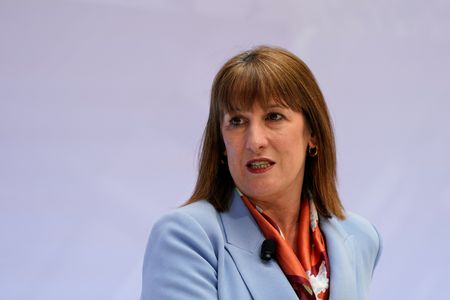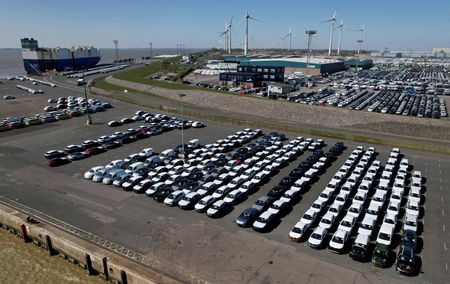(This May 7 story has been corrected to show that Caswell was referring to Reeves’ budget update in March, not her full budget in November, in paragraph 9)
By William Schomberg
LONDON (Reuters) – British finance minister Rachel Reeves looks set to miss her budget targets again, in part due to the economic growth hit from her tax increase on employers, raising the prospect of more tax hikes later this year, a think-tank said on Thursday.
Weaker than expected growth over the remainder of this decade could see the government spending 57 billion pounds ($76 billion) more than it collects in taxes in the 2029/30 tax year, the National Institute of Economic and Social Research said.
Reeves has made balancing the current budget by the end of the decade one of her fiscal targets, funding all non-investment spending through taxation rather than borrowing.
She announced a big tax increase on businesses in November which left her only a narrow leeway of 10 billion pounds to meet her fiscal targets in 2029/30.
In a quarterly outlook report, NIESR cut its forecasts for British economic growth to 1.2% in 2025 from a previous estimate of 1.5%, kept unchanged its forecast for 2026 at 1.5% and lowered its projections for the subsequent years to 2030.
Benjamin Caswell, a senior economist at NIESR, said the downgrade mostly reflected domestic factors rather than the impact of U.S. President Donald Trump’s increased trade tariffs.
“Yes, tariffs have engendered a lot of uncertainty, but I don’t think that should be basically taking the government off the hook,” Caswell said.
Reeves has referred to the changing global economic picture when talking about the outlook for Britain.
Caswell said Reeves’ decision in March to restore only a small margin of error for meeting her end-of-decade budget target meant businesses were nervous about possible further tax hikes, and this was affecting hiring and investment decisions.
Despite the slower growth outlook, the Bank of England is likely to cut interest rates only twice more in 2025 – a quarter-point reduction later on Thursday and another towards the end of the year – because of inflation pressures caused by still strong wage growth in Britain, NIESR said.
November’s increase in social security contributions paid by employers and a nearly 7% increase in the national minimum wage will keep upward pressure on inflation, the think-tank added.
It forecast British consumer price inflation would average 3.3% this year and 3.1% in 2026 – compared with its previous forecasts of 2.4% and 2.0%.
($1 = 0.7483 pounds)
(Writing by William Schomberg; Editing by David Milliken and Gareth Jones)










